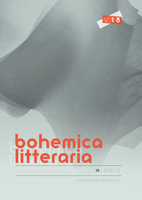Why Zombies Matter: The Undead as Critical Posthumanist
Why Zombies Matter: The Undead as Critical Posthumanist
Author(s): Dale KnickerbockerSubject(s): Fiction, Social Philosophy, Philosophy of Science, Social development, Theory of Literature, Ontology
Published by: Masarykova univerzita nakladatelství
Keywords: Zombie; posthuman; technological singularity; humanism; antihumanism;
Summary/Abstract: This paper poses two questions: why have we brought back the living dead so many times in so many different forms, and what is the cultural significance of its most recent resuscitation? With respect to the latter query, I propose three ideas: first, that the zombie has become the biotechnological equivalent of the science-fictional cyborg, as they both express the same anxieties and thus fulfill a similar cultural function. Second, as humans converted into another species, they are posthuman, and their genocidal war on humanity is homologous to the science-fictional Terminators and apocalyptic cyborgs and artificial intelligences. In the same way, the heralded “zombie apocalypse” is a fictional historical evolutionary turning point homologous to John Von Neumann‘s and Vernor Vinge‘s “technological singularity.” Third, the change in rationalization of zombification from the supernatural to the scientific in the 1960s signified a reaction against instrumental reason, technoscience, modernity, and the values of Humanism. This is evident in recent iterations in which the zombie is the result of a plague cause by genetic experimentation. I conclude that this millennial zombie is the poster child for an antihumanist, critical posthumanism. Finally, in response to the first query, I will propose seven theses explaining this monster’s durability and mutability based on these observations.
Journal: Bohemica litteraria
- Issue Year: 18/2015
- Issue No: 2
- Page Range: 59-82
- Page Count: 24
- Language: English

